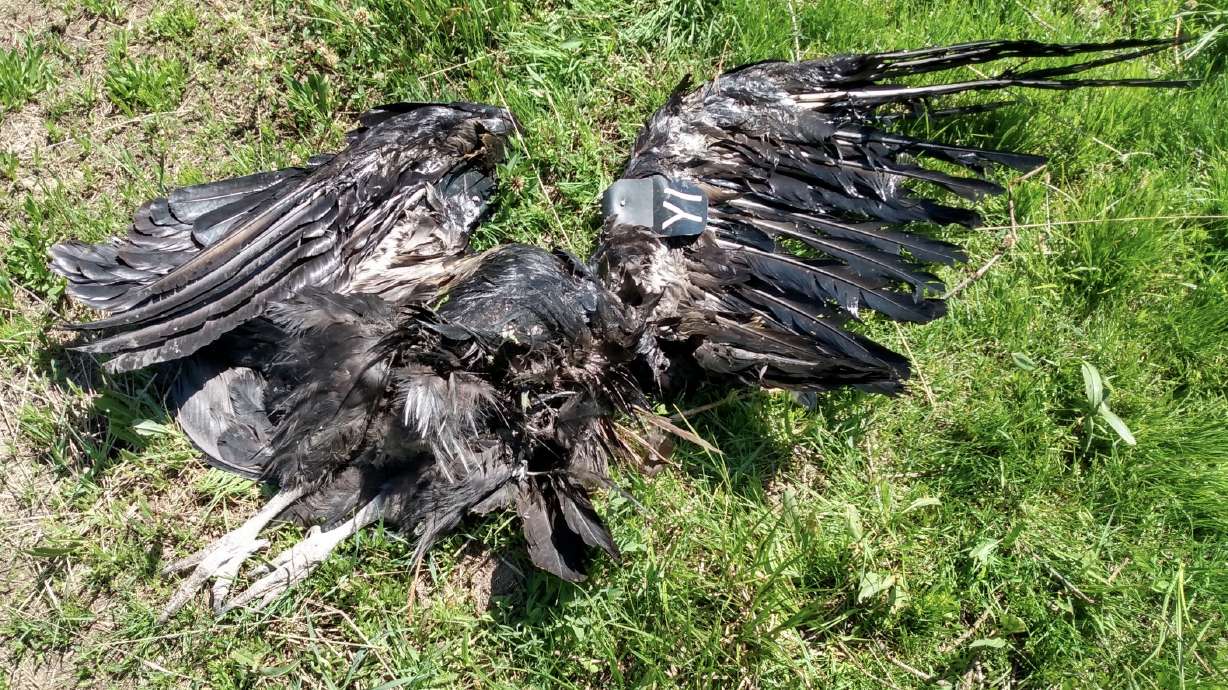Estimated read time: 3-4 minutes
This archived news story is available only for your personal, non-commercial use. Information in the story may be outdated or superseded by additional information. Reading or replaying the story in its archived form does not constitute a republication of the story.
CEDAR CITY — State and federal wildlife officials are asking for the public's help in figuring out who illegally killed two "critically endangered" bird species near Zion National Park within the past two years.
An investigation headed by the Utah Division of Wildlife Resources and the U.S. Fish and Wildlife Service began in the fall of 2022 when a California condor was found dead. The bird was located in a "remote area" southeast of Cedar City and near the northern boundary of Zion National Park, near Cedar Breaks National Monument.
The condor was determined to have been shot, but it wasn't clear by what type of firearm or bullet caliber, Faith Heaton Jolley, spokeswoman for the Utah Division of Wildlife Resources, told KSL.com on Friday.
She said the investigation was never made public because the agencies had some information to work on. It hadn't produced any arrests before a second case emerged last month, which led the agencies to speak out.
The second condor was found dead in June not far from where the first condor was killed, also by some sort of firearm. The agencies didn't release much information about the birds other than to say the second condor was a male.
Several condors in Utah are banded by biologists who research them. It wasn't clear if both birds killed were banded, but a photo of the second bird shows it was banded with the code "Y1" or "YI."
"It's honestly really frustrating," Jolley said. "There's so much effort and so many people, programs and resources involved in the recovery of this species, and to see somebody intentionally go and try to kill some of these birds is really disheartening."
California condors play a vital role in southern Utah's ecosystem, removing toxins and disease by scavenging dead animals.
However, they're considered "critically endangered" with an estimated global population of just over 550 found across Utah, Arizona, California and Mexico. Their population fell to just 22 birds in the 1980s largely because of lead poisoning from hunting ammunition.
Related:
Their near extinction led to many reforms that helped it recover to its current population. Yet the Utah-Arizona flock population — now estimated to be about 85 — has faced other setbacks beyond poaching. Nearly two dozen condors from the flock died during an avian flu outbreak last year.
Russell Norvell, the Utah Division of Wildlife Resource's avian conservation program coordinator, said these two events have undone years of work to improve population numbers.
"The illegal killing of these two condors is a devastating and unnecessary loss on top of all the recent deaths from the highly pathogenic avian influenza," he said in a statement. "Between the two events, we've lost more than a decade's worth of progress in the recovery of this species."
Since there are so few California condors, the species is also protected by the Endangered Species Act. It prevents anyone from shooting, harassing, trapping, capturing or doing anything else that may harm the birds.
Poaching a California condor is considered a third-degree felony in Utah, which can result in a maximum punishment of five years in prison, a $5,000 fine and a restitution fee of $1,500. It may also lead to federal charges.
Anyone who may have any information about the cases is encouraged to call the U.S. Fish and Wildlife Service tip line at 844-397-8477 or the Utah poaching hotline at 800-662-3337. Tips to state conservation officers can also be submitted via text to 847411, while both state and federal agencies also have online/app tip submission options.
State wildlife officials added that requests for confidentiality will be respected and that a reward may be available if information provided leads to a conviction.
Jolley said she hopes that the public can provide help while biologists get back to focusing on condor recovery.
"California condors and some of our other raptor species are critical for healthy ecosystems," she said. "People need to care about condors. They need to care about these species."










